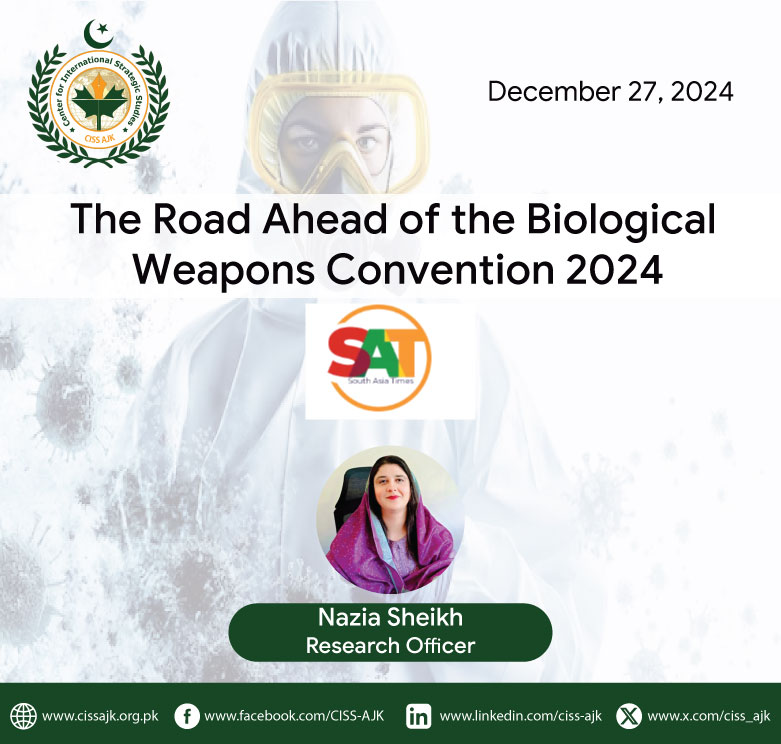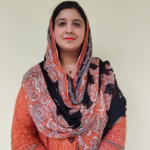Introduction
The latest effort by states-parties to fortify the Biological Weapons Convention (BWC) will be completed halfway by this month’s end. At the convention’s ninth review conference in 2022, a working group was established to identify, examine, and develop specific and effective measures, including possible legally binding measures, and to make recommendations to strengthen and institutionalize the Convention in all its aspects.
The convention has reinforced the prohibition against biological warfare, established a forum for collaboration on security responsibilities, and promoted a shared worldwide responsibility to protect biological sciences against misuse.
More than 20 offensive bioweapons projects have been dismantled since the BWC was ratified in 1975, making it the first multilateral disarmament treaty to ban a whole class of weapons. Its nearly universal commitment to preventing the weaponization of biological agents is demonstrated by its current membership of 187 States Parties and 4 signature states. Additionally, the BWC supports legitimate scientific advancement by promoting the peaceful exchange of biological materials, tools, and scientific knowledge.
Despite these achievements, the BWC still faces many obstacles, and it must be updated to reflect current scientific findings and strengthen global biosecurity. Countries differ greatly in how they carry out the convention’s requirements, and there are no procedures to check for or enforce conformity.
For instance, the BWC finds it difficult to handle the hazards associated with dual-use research and developing technologies, and the rapid advancements in biotechnology make issues even more complicated.
The Working Group
Seven areas were assigned to the working group: international cooperation and assistance; scientific and technological advancements that are pertinent to the convention; transparency and confidence building; compliance and verification; national implementation; assistance; response and readiness in the event of the use of biological or toxic weapons; and organizational, institutional, and financial issues.
The working group was granted 60 days to develop ideas for institutionalizing and strengthening every facet of the BWC, which amounted to 15 days per year for four years. There has been debate over the best way to achieve this over the treaty’s nearly 50-year existence. With states-parties unable to agree on promoting stronger vulnerability, cooperation, and compliance procedures, the majority of the issues have already been discussed. The act is now being repeated during a time when global ties are very tense.
Although there has been significant progress in several areas there is underlying tension on the fundamental structure of arms control accords. This raises the question of whether states-parties can agree to a new model that permits states to opt into the mechanisms with which they agree and opt out of any processes or new commitments they are unable to support, or if strengthening the BWC must adhere to the traditional model of legally binding multilateral agreements with declarations, inspections, investigations, and an international organization where consensus rules. While there are still many unresolved issues, the working group may be able to deliver on at least one of its main goals and recommendations for the creation of two new BWC mechanisms early in 2025.
Biological Weapon Convention–Pakistan’s Approach
The Biological Weapons Convention (BWC) is a key component of the international security and weapons control framework. Pakistan regards the BWC, its Review Conferences, and its intersessional meetings as crucial forums for advancing the equitable application of all of the Convention’s articles, including through multilateral talks to reach a legally binding Protocol that also covers the Convention’s effective implementation and verification.
As one of the 22 founding members, Pakistan signed the BWC in 1972 and ratified it in 1974, which was required for the convention to come into effect. Pakistan has continued to have a proactive and positive outlook towards the BWC since 1974. In 2006, the Pakistan Mission served as the President of the BWC Review Conference, demonstrating their active participation in and support of the BWC system. At the 9th BWC Review Conference in December 2022, Pakistan was crucial in the formation of the Working Group on the Strengthening of the Convention, which was tasked with identifying, analyzing, and developing specific and effective measures, including potential legally-binding measures, as well as making recommendations to institutionalize and strengthen the Convention in all of its aspects.
Challenges Ahead of BWC
The working group faces a difficult task; failure is more likely than success. The difficulties include several substantive issues requiring flexibility and convincing everybody who wishes to strengthen the convention to commit to investing more time and money to meet their stated goals.
In the process of finalizing the mechanisms, flexibility will be necessary. Unlike vague, open-ended demands for increased funding, collaboration, and technology transfers, the international cooperation mechanism is more targeted and practical.
The third obstacle is financial. According to certain state parties, they are unable to justify increasing their assessed payments to balance significant increases in the BWC budget. The work might as well stop right now if that’s the case. The convention cannot be strengthened without a commitment to increase the number of meetings, institutional assistance, and Implementation assistance Unit staff. The BWC shortcomings will not be mitigated by a frugal strategy. If December’s outcome is successful, States Parties will have voted to hold a Special Conference in 2025 to legally create two crucial instruments to advance the convention: Firstly, International cooperation and assistance and secondly, scientific and technological review. Overall, the working group has advanced, partly because the states-parties are not focusing on the perfect answer but rather on what might be realistic and incremental. Therefore, even if the working group is successful, there is still a lot of work to be done after that.
The views expressed in this article are the author’s own. They do not necessarily reflect the editorial policy of the South Asia Times.
Nazia Sheikh is a Research Officer at Centre for International Strategic Studies, AJK. She is an MPhil scholar in international relations from international Islamic university Islamabad.




